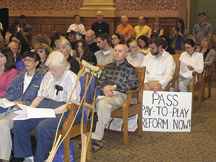The Jersey City City Council voted 8-0 with one abstention Wednesday night for a pay-to-play ordinance preventing developers from making campaign contributions while in negotiations to become a designated developer as part of a redevelopment agreement with the city. Any developer found in violation of the ordinance would be barred for doing development in the city for four years.
“Jersey City has a tremendous image problem.” – Aaron Morrill
________
The reason the ordinance was reintroduced last month by Fulop was due to the 44 arrests, made on July 23, of New Jersey public officials charged with taking cash for political campaigns.
The cash often came from the federal government’s “cooperating witness,” Solomon Dwek, who posed as a developer and used a different name.
But there has been much discussion in recent weeks by Fulop, City Councilman Bill Gaughan, and various members of the community about this ordinance. Some discussion arose at Tuesday’s council caucus, where council members and the city’s corporation counsel, Bill Matsikoudis, debated with Fulop over “vague” and questionable aspects in the ordinance.
That led to changes such as taking out a clause allowing private citizens to sue developers and others in violation of the ordinance. The council also added a time structure, saying developers should not donate to a campaign three months before putting in an application to be a developer on a city redevelopment project.
Those changes were voted on first by the council on Wednesday. Then the council voted for the amended ordinance.
People speak out
There were approximately 20 speakers who, for over an hour, advocated for the ordinance to be passed without changes. The speakers also referred to the July 23 arrests.
Wednesday also happened to be the day when two of the 44 arrested; Jersey City officials Guy Catrillo and Maher Khalil, pleaded guilty to accepting cash from Dwek (see cover story).
But after voting on the ordinance, Fulop said the changes, while not to everyone’s liking, were a “first step” towards reforming government. He said he sees the ordinance being revisited in future meetings.
“I think we can do it incrementally,” Fulop said. “I think now we got it on the books and it’s a huge step and it has taken two years, and we can go from here and see what works and what doesn’t.”
Mayor Jerramiah Healy, in a letter to the City Council read at Wednesday’s meeting, requested the council approve the ordinance but expressed “concern” that reform legislation such as this ordinance would only benefit wealthy candidates who can forgo seeking contributions from developers.
Reforming Jersey City’s image
Even if not everyone supported this version of the the redevelopment pay-to-play ordinance, a common theme came through – this legislation was seen as an initiative to bring some aura of respectability to Jersey City. Lately, the mention of the state’s second largest city has been in context of arrested officials and un-arrested development.
Longtime resident John Seborowski wanted the ordinance passed “unanimously.” He said that if it had been passed last year, it would have prevented those running for elected office earlier this year who were arrested in July from accepting developers’ cash.
Council critic Yvonne Balcer remarked, “Jersey City is a joke” as she pushed for the ordinance to be passed without changes. She said she sees “developers calling the shots” in the operation of city government, especially when the council approves tax abatements for projects from developers who donate to politicians.
Aaron Morrill was vehement about the ordinance being passed in its original form, and took issue with Mayor Healy having no problem with officials accepting any contributions from developers doing business with the city after the July 23 arrests.
“Jersey City has a tremendous image problem,” Morrill said. “This city needs to re-brand, and tonight is your opportunity to re-brand.”
City Councilman Michael Sottolano said the process getting the ordinance approved was a “rocky road,” but voted in the affirmative as the ordinance “will serve a better purpose for the city and its image.”
City Councilwoman Viola Richardson, however, said those looking to the ordinance helping to reform Jersey City’s image would do well to stop “beating up on Jersey City,” and support the ordinance.
The lone abstention was City Councilwoman Willie Flood, who said she needs to take “an in-depth look” at the ordinance.
Ricardo Kaulessar can be reached at rkaulessar@hudsonreporter.com.
